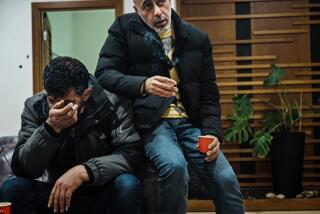Arafat’s Wife Now His Gatekeeper
- Share via
RAMALLAH, West Bank — When Suha Tawil married Yasser Arafat 13 years ago, the pairing was considered so scandalous that Arafat’s top aides kept the wedding secret for more than a year, fretting over what Palestinian reaction would be when word leaked out.
She was more than 30 years his junior, a sleek and pampered woman who had left the rocky hills of the West Bank for the twinkling lights of Paris. He was a grizzled, pistol-toting guerrilla leader already into his 60s, a nomad whose mythology had long proclaimed him to be “married to the revolution.”
Odder matches have proved happy ones, but just as Arafat’s lieutenants expected, the Palestinian masses never clasped Suha Arafat to their hearts. Even his inner circle could never have predicted just how messy the denouement of this unlikely marriage would prove to be.
After more than four years of gilded exile, the 41-year-old Palestinian first lady flew to her husband’s side 12 days ago after his collapse from an undisclosed ailment at his battered West Bank compound. She has since emerged as the apparent executor of a vast fortune, as well as the sole guardian of life-and-death decisions for the 75-year-old Palestinian Authority president, who lies critically ill in a military hospital outside Paris.
On Monday, when Suha Arafat denounced her husband’s closest aides as conspirators who were trying to kill him prematurely -- and they in turn flew to Paris hours later, against her wishes -- it appeared to mark the joining of a battle royal.
Yasser Arafat’s loyalists were incensed by his wife’s accusations, relayed early Monday in a telephone call to the Arabic satellite TV channel Al Jazeera.
“Let it be known to the honest people of Palestine that a gang of would-be inheritors are coming to Paris,” Suha Arafat said in Arabic, her voice rising. “You have to understand the scope of this conspiracy. I tell you, they are trying to bury alive Abu Amr” -- her husband’s nom de guerre.
Out of respect for Arafat, few Palestinians would have criticized his wife publicly. But in an indication that almost no one expects him to recover, the vitriol directed at her Monday was unrestrained, encompassing rumors about extravagant spending and her relocation to Paris at the start of the Palestinian intifada, or uprising, in September 2000.
“It’s sheer insolence -- she didn’t even give up the fancy restaurants of Paris for a week to come back here, but now she wants to decide for us who sees the rais [leader] and who doesn’t,” fumed Sufian abu Saida, a senior official with Yasser Arafat’s Fatah faction.
Others say they understand the fragile emotional state of someone who is probably bound for early widowhood, but laced their sympathy with scorn and anger.
“I wasn’t surprised by what she said, because she is very high-strung by nature,” said Imad Shakur, an advisor to Yasser Arafat. “It’s a shame -- she has always been detached, she has never been close to the problems and pains of the Palestinian people.... Right from the beginning, she never found her place.”
Suha Arafat found few defenders among ordinary Palestinians, who are convinced that she absconded with millions to support a lavish lifestyle.
“I never respected her as the wife of our president,” said Munzer abu Ramadan, a grocery shop proprietor in Gaza City. “Even before they married, I thought she was a bad woman. Why is she sitting at his bedside now? She is kidnapping the money. She wants to get everything before he dies.”
Although few can state with authority exactly how much wealth Suha Arafat controls or could control, the estimates are eye-catching. Last year, Forbes magazine estimated Yasser Arafat’s assets to be at least $300 million, and rumors have swirled for years over reports that his wife received a monthly allowance of $100,000 from Palestinian coffers.
Authorities in Europe last year reportedly investigated the alleged transfer of more than $11 million into Suha Arafat’s bank account during 2002 and 2003. The allegation has not been substantiated, and when it was publicized, she lashed out at Israeli Prime Minister Ariel Sharon, saying he was trying to embarrass her husband by spreading untruths about Palestinian finances.
The Palestinian first lady has always sought to deflect blame for corruption in the Palestinian Authority away from her husband and toward his senior aides.
“Every beautiful flower ends up surrounded by weeds,” she has often told interviewers.
Suha Tawil was a child of privilege, accustomed from an early age to international travel. Her mother, Raymonda Tawil, was a journalist and a famous local beauty in the West Bank town of Ramallah. Her late father, Daoud Tawil, was the scion of a banking family in the northern West Bank city of Nablus.
Raymonda Tawil -- who married, like her daughter, a much older man -- was said to have been close to members of the Palestinian national movement, including Arafat. During Suha’s childhood, Raymonda Tawil’s activism earned her Israeli-ordered house arrest and sporadic exile -- sometimes to Paris, where Suha later attended the Sorbonne.
In her mid-20s, Suha Tawil was still living in Paris when she met Arafat, who hired her to do public relations work for the Palestine Liberation Organization. He brought her to Tunis, Tunisia, where he was living in exile, and they married soon afterward. The Greek Orthodox-raised Suha Arafat converted to Islam, but was known afterward to observe Christian religious holidays.
When Yasser Arafat was allowed by Israel to return to the Palestinian territories in 1994, his wife accompanied him but did little to endear herself to his people. After the birth in 1995 of their only child, a girl named Zahwa, Suha Arafat infuriated many Palestinians when she told a French magazine that she had traveled to Paris for the birth because “in Gaza, the sanitary conditions are terrible.”
Her anti-Israel views caused awkward moments for the Palestinians during an era when the two sides seemed to be moving toward a comprehensive accord. In 1999, during a visit by then-U.S. First Lady Hillary Rodham Clinton, Suha Arafat gave a rambling speech in which she accused Israel of poisoning Palestinian children.
As Suha Arafat girds for possible battle with the Palestinian entourage, she has a crucial advantage in France, where strict medical privacy laws give her control over who may see him and access to medical records.
So the Palestinian leaders who flew to Paris on Monday -- the former Palestinian Authority premier, Mahmoud Abbas; the current prime minister, Ahmed Korei; and the foreign minister, Nabil Shaath -- could find themselves shut out.
“We don’t know if they will see Arafat,” said a French government official, speaking on condition of anonymity. “That must be done in liaison with the family. It is not clear what will happen.”
Hospital officials have made four very brief statements since Yasser Arafat was rushed here Oct. 29. They have said little more than that Arafat is alive and in very serious but stable condition.
Not surprisingly, the Israeli media have settled back to enjoy the verbal punch-up between the Palestinian first lady and Arafat’s aides. Editorial cartoons have mocked the bland medical bulletins of recent days and suggested she is keeping her husband alive for her own purposes.
A cartoon in the Yediot Aharonot daily on Monday showed her gazing at a tombstone, holding a hammer and chisel and looking satisfied with her handiwork. The inscription on the stone reads: “Still Stable.”
Speculation in Paris and Ramallah has begun to focus on scenarios for Arafat’s death and burial. If Arafat is in a coma and being kept alive by machines, as French media have reported, citing medical sources, the decision to turn off life support is his wife’s.
Palestinians have been whispering for days about the approach of a religious occasion today -- the Night of Destiny, which falls on the 27th day of the holy month of Ramadan. Said to commemorate the handing down of the Koran to the Prophet Muhammad, it is a time when tradition holds that the gates of heaven open and the fate of all Muslims is decided by God.
In the well-kept Ramallah neighborhood where Suha Arafat spent much of her childhood, neighbor Widad Salah -- a lively 82-year-old whom the young Suha used to address as “Auntie” -- recalled a sweet child who grew into a sensitive woman.
But like so many Palestinians, she expressed distaste about the Palestinian first lady’s behavior -- particularly her outburst on Al Jazeera.
“Well,” Salah said thoughtfully, shaking her head, “Paris and money will do that to you.”
Times staff writers Sebastian Rotella in Paris and Tracy Wilkinson in Gaza City contributed to this report.
More to Read
Sign up for Essential California
The most important California stories and recommendations in your inbox every morning.
You may occasionally receive promotional content from the Los Angeles Times.













